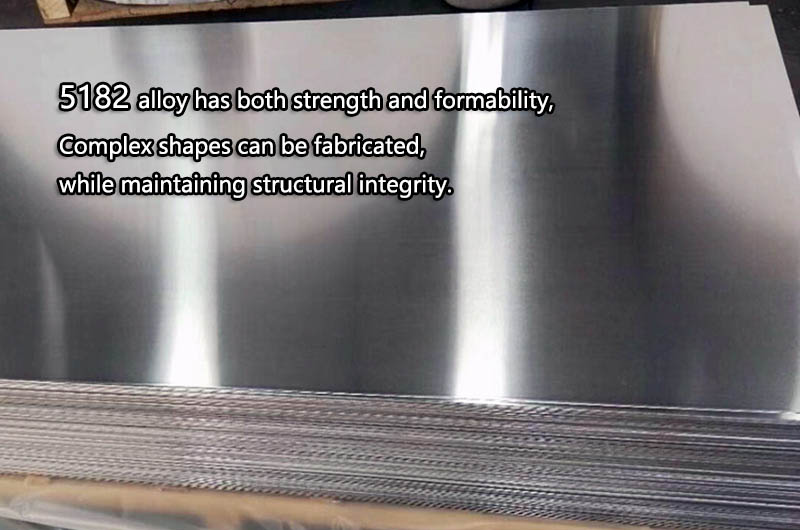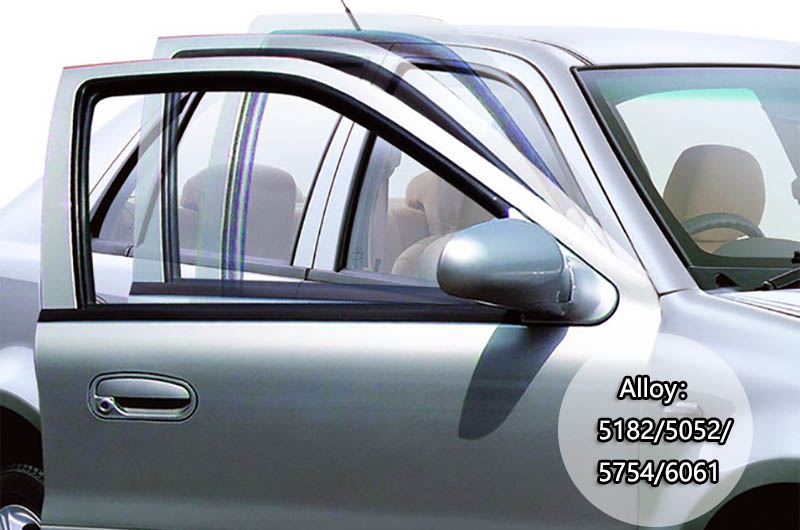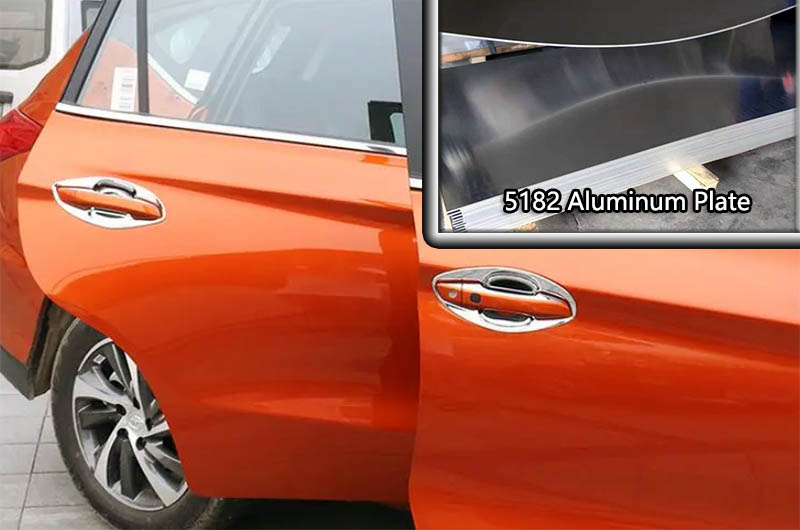Automotive Aluminum Plate for Car Door
Alloy: 5182/5052/5754 Specifications can be customized
Automotive aluminum plates are often used to make car doors because of their lightweight and strong characteristics. The choice of specific aluminum alloy and sheet thickness depends on the vehicle manufacturer's design requirements and performance specifications.
Automobile lightweight is an effective measure to achieve energy saving and emission reduction. On the premise of ensuring vehicle safety and comfort, relatively lightweight materials are selected to reduce the weight of the automobile. Aluminum alloy has low density and high strength. In recent years, it has been more and more widely used in the field of automobile manufacturing. Among them, 5182 aluminum plate is commonly used for automobile door panels.
5182 alloy is commonly used in car doors, but other aluminum alloys can also be used depending on the specific requirements and design considerations of different models.

5182 aluminum alloy is often chosen for car doors for its corrosion resistance, which is critical for exterior panels exposed to all weather conditions. The alloy combines strength and formability, enabling complex shapes to be fabricated while maintaining structural integrity.
Automobile lightweight is an effective measure to achieve energy saving and emission reduction. On the premise of ensuring vehicle safety and comfort, relatively lightweight materials are selected to reduce the weight of the automobile. Aluminum alloy has low density and high strength. In recent years, it has been more and more widely used in the field of automobile manufacturing. Among them, 5182 aluminum plate is commonly used for automobile door panels.
5182 aluminum alloy belongs to the 5xxx series of aluminum alloys and is known for its excellent corrosion resistance. It contains magnesium as the main alloying element for good strength and formability. The alloy also contains small amounts of other elements such as manganese and chromium to further enhance its properties.
Automotive Aluminum Alloy for Car Door
In terms of doors, some aluminum alloys commonly used in automotive applications include:
- 5xxx Series Alloys: 5xxx series aluminum alloys, such as 5052 or 5754, are often used in automotive door panels. These alloys combine strength, formability, and corrosion resistance, making them suitable for this application.
- 6xxx Series Alloys: 6xxx series alloys such as 6061 or 6063 are also used in door applications. These alloys are known for their excellent strength-to-weight ratio, which contributes to the lightweighting of vehicles. However, they may require additional treatments, such as heat treatment, for optimum strength.

The choice of aluminum alloy depends on a variety of factors, including the desired balance between weight reduction and structural integrity, cost considerations, and specific performance requirements.
Automotive Aluminum Plate for Car Door Specifications
- Alloys: The alloys used for automotive aluminum sheets can vary but are usually from the 5xxx or 6xxx series, such as 5182 or 6061.
- Thickness: The thickness of the door aluminum sheet can range from 1.0 mm to 3.0 mm, depending on the required strength, weight, and design requirements.
- Width and Length: The width and length of the aluminum sheet depend on the size and manufacturing process of the door. Standard widths range from 1000mm to 2000mm and lengths can be customized to suit specific door designs.
- Tempering: The tempering of aluminum sheet can vary depending on the desired properties. Common tempers include H32, H34, or H36, which offer a balance of strength, formability, and corrosion resistance.
- Surface Finish: The surface finish of aluminum panels can vary, including options such as a honed, brushed finish, or painted finish, depending on aesthetic and functional requirements.
| Automotive Aluminum Plate | Typical Size (mm) |
|---|---|
| Automotive Aluminum Plate for Car Door | 800 x 600 |
| Automotive Aluminum Plate for Car Door | 1000 x 800 |
| Automotive Aluminum Plate for Car Door | 1200 x 1000 |
| Automotive Aluminum Plate for Car Door | 1600 x 1200 |
| Automotive Aluminum Plate for Car Door | 2000 x 1200 |

In terms of plate thickness, it can vary according to specific car models and their design requirements. Thinner plates are typically used to reduce weight and improve fuel efficiency, while thicker plates are available in areas that require increased strength and impact resistance.
It’s worth noting that doors are often made up of multiple layers or components, including outer panels, inner reinforcements, and additional materials for sound insulation and impact protection. The use of automotive aluminum panels in doors is generally limited to outer panels, where weight reduction is the top priority.
Ultimately, the specific choice of automotive aluminum sheet for the door depends on the vehicle manufacturer's design specifications, performance requirements, and cost considerations, which may vary between different models and manufacturers.
Automotive Aluminum Plate for Car Door Properties
Automotive aluminum sheets are commonly used in various parts of the car, including the doors. Aluminum is a lightweight and durable material that offers several advantages for automotive applications. Here is some information about automotive aluminum sheets for car doors:
- Lightweight: Aluminum is much lighter than steel, which helps reduce the overall weight of the vehicle. This weight reduction helps improve fuel efficiency, handling, and performance.
- Strength: Despite its light weight, automotive aluminum panels still have highstrength and structural integrity. The specific aluminum alloy used can be tailored to meet the strength and stiffness required for the door application.
- Crashworthiness: The energy-absorbing properties of aluminum make it suitable for enhancing the crashworthiness of automobiles. It absorbs the impact energy of a collision and helps protect the occupants of the vehicle.
- Corrosion Resistance: Aluminum naturally forms a thin oxide layer on its surface, which has excellent corrosion resistance. This property is critical for vehicle doors that are exposed to various environmental elements.
- Formability: Aluminum is highly formable, allowing manufacturers to create complex shapes and designs for vehicle doors. This versatility allows designers to optimize the door's aesthetics, function and aerodynamics.
- Recyclability: Aluminum is highly recyclable, making it an environmentally friendly choice. Using recycled aluminum in the manufacturing process reduces energy consumption and greenhouse gas emissions.
When using automotive aluminum sheets to make doors, manufacturers typically employ specific manufacturing processes, such as stamping, forming and joining techniques, to shape and assemble the aluminum sheets into the final door structure. These processes ensure doors meet safety, performance and fit requirements.
Note: While aluminum offers several advantages, vehicle doors are often composed of a variety of materials, including steel reinforcement and other composite materials, to achieve the desired combination of strength, stiffness and safety standards.
Recommended content you might be interested in
-
5182 Automotive Aluminum Plate Sheet
5182 Automotive Aluminum Plate Sheet has a flat shape, high quality, good corrosion resistance, good weight reduction, and energy-saving effects, and its safety and comfort are better provided.
-
5083 Automotive Aluminum Plate Sheet
5083 Automotive Aluminum Plate Sheet has good formability and can be easily formed into various auto parts by rolling, bending, stamping, and other processes.
-
5754 Automotive Aluminum Plate Sheet
5754 Automotive Aluminum Plate Sheet has good formability and can be easily formed into various automotive parts by rolling, bending, and stamping processes. It can be formed into complex shapes while maintaining its strength and integrity.
You might like the following content
-
5182 Aluminum Plate Sheet
5182 aluminum plate, which is a deformed alloy with good corrosion resistance, good weldability, corrosion resistance, medium strength and cold working properties.
-
5182 h19 Aluminum Plate Sheet
5182 H19 is a non-heat treatable aluminum alloy with excellent corrosion resistance and ductility, good formability and strength. 5182 aluminum plate is suitable for gas welding, argon arc welding, spot welding, seam welding and other welding, and its welding performance is very good.
-
5182 h111 Aluminum Plate Sheet
5182 H111 is a non-heat treatable aluminum alloy with a good combination of formability and strength. 5182 H111 aluminum plate has high corrosion resistance and is very suitable for tank truck materials.
-
5182 o Aluminum Plate Sheet
5182 O aluminum plate is used for car doors, fenders, and engine hoods. It has good stamping effect, corrosion resistance, good formability, and high safety factor.

